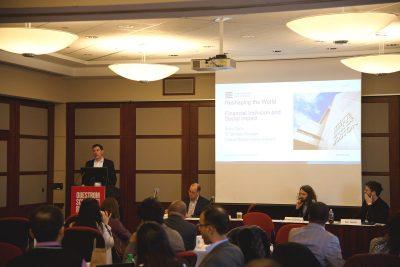
The Hubert H. Humphrey Fellowship Program hosted their first Reshaping the World 2020: Financial Inclusion and Social Impact Conference Thursday at the Questrom School of Business.
Conference organizer Yoo Jin Chung, a senior lecturer at Boston University and director of the fellowship program, said the event aimed to provide a forum for people to discuss and share their work in the area of financial inclusion, or how they try to make certain financial aspects available to everyone.
“The purpose of this event was to create this interdisciplinary dialogue around financial inclusion among the researchers, practitioners, policymakers and in some of our students,” Chung said in an interview.
The Hubert H. Humphrey Fellowship Program is a graduate-level program that currently hosts 13 fellows. Each fellow follows a specially tailored course of study in the field of banking and finance, according to its website.
The conference was run in part with the Susilo Institute for Ethics in the Global Economy, a group operating out of Questrom that looks into the ethical challenges business face around the world.
The day was split into six parts and featured a panel discussion on “current issues in financial inclusion,” a presentation on “improving the governance of non-profit organizations to increase their social impact,” and a panel about financial technology and social impact.
There were nine speakers total, including keynote speaker Ivo Jenik, a financial sector specialist at the Consultative Group to Assist the Poor, presenter Mark Williams, a James E. Freeman lecturer chair at BU and panelist Brian Gilmore, director of Commonwealth, a group seeking ways to increase financial security and opportunity across the world.
Wendy Cao, a senior program coordinator for the fellowship program and another conference organizer, said financial inclusion and its global impact is an important topic in society today, which is why it was the conference’s topic.
“It’s a very popular topic now, financial inclusion, especially when you consider it from the point of view of a more international perspective, especially from our fellows who are coming from developing countries,” Cao said.
The event was open to the public and free to attend. Chung said the organizers decided to do this so it could be open to more people.
“We want to make sure that anyone could have access to this type of learning experience,” Chung said. “I think that by making it free, it makes the events and the program more accessible to a bigger community.”
The conference’s goal was to provide a platform for people in the business field to gather and share their work and interests, Chung said.
“It’s another way of building bridges among people and different departments and research institutes and clubs,” she said. “If you look at the panelists and the participants, it ranges from students, undergraduates and graduate students, some of the student clubs and nonprofits and people from the financial industry and government.”
Depending on the event’s success, Chung said there may be more conferences in the future.
“We would be interested in continuing this legacy and having more yearly conferences going forward,” Chung said. “Because we believe that collaborating with a lot of different stakeholders, inside and outside, and universities is a really meaningful way of sharing knowledge.”
Several people who went to the conference said the topic of financial inclusion needs to be talked about more and the conference helped with that.
Crystal Chng, a junior in Questrom, said she came to the conference because her professor recommended it, but she also had a personal interest in the topic and its accessibility to her at BU.
“I was quite interested in learning more about financial inclusion in Boston and how it can be relevant and [also] insight that I can pick up along the way here, rather than in Singapore,” Chng said.
Georgina Noriega, a resident of Mexico who attended the conference during her vacation in Boston, said she found the event online and was glad she decided to attend.
“I like the fact that BU combines people from the industry and academics and that they will share their opinions,” Noriega said. “I think that’s what makes this event pretty rich for the students and for the people that are not students and are coming from the outside.”
















































































































